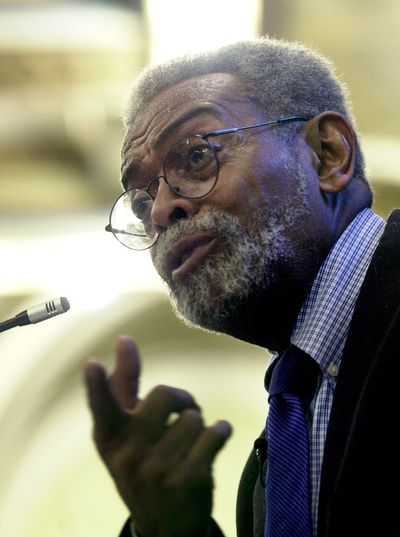Black Arts Movement leader dies at age 79
Controversial Baraka was cultural driving force

Amiri Baraka, the militant man of letters and tireless agitator whose blues-based, fist-shaking poems, plays and criticism made him a provocative and groundbreaking force in American culture, has died. He was 79.
His booking agent, Celeste Bateman, told the Associated Press that Baraka, who had been hospitalized since last month, died Thursday at Newark Beth Israel Medical Center.
Perhaps no writer of the 1960s and ’70s was more radical or polarizing than the former LeRoi Jones, and no one did more to extend the political debates of the civil rights era to the world of the arts.
He inspired at least one generation of poets, playwrights and musicians, and his immersion in spoken word traditions and raw street language anticipated rap, hip-hop and slam poetry. The FBI feared him to the point of flattery, identifying Baraka as “the person who will probably emerge as the leader of the Pan-African movement in the United States.”
Baraka transformed from the rare black to join the Beat caravan of Allen Ginsberg and Jack Kerouac to leader of the Black Arts Movement, an ally of the Black Power movement that rejected the liberal optimism of the early ’60s and intensified a divide over how and whether the black artist should take on social issues. Scorning art for art’s sake and the pursuit of black-white unity, Barak was part of a philosophy that called for the teaching of black art and history and producing works that bluntly called for revolution.
He was as eclectic as he was prolific: His influences ranged from Ray Bradbury and Mao Zedong to Ginsberg and John Coltrane. Baraka wrote poems, short stories, novels, essays, plays, musical and cultural criticism and jazz operas. His 1963 book “Blues People” has been called the first major history of black music to be written by an African-American. A 2002 poem he wrote alleging that some Israelis had advance knowledge of the Sept. 11 attacks led to widespread outrage.
He was denounced by critics as buffoonish, homophobic, anti-Semitic, a demagogue. He was called by others a genius, a prophet, the Malcolm X of literature. Eldridge Cleaver hailed him as the bard of the “funky facts.” Ishmael Reed credited the Black Arts Movement for encouraging artists of all backgrounds and enabling the rise of multiculturalism. The scholar Arnold Rampersad placed him alongside Frederick Douglass and Richard Wright in the pantheon of black cultural influences.
“From Amiri Baraka, I learned that all art is political, although I don’t write political plays,” the Pulitzer Prize-winning dramatist August Wilson once said.
In 2002, respected enough to be named New Jersey’s poet laureate, he shocked again with “Somebody Blew Up America,” a Sept. 11 poem with a jarring twist.
“Who knew the World Trade Center was gonna get bombed,” read a line from the poem. “Who told 4,000 Israeli workers at the Twin Towers to stay home that day?”
Then-Gov. James McGreevey and others demanded his resignation. Baraka refused, denying that “Somebody Blew Up” was anti-Semitic (the poem also attacks Hitler and the Holocaust) and condemning the “dishonest, consciously distorted and insulting non-interpretation of my poem.” Discovering he couldn’t be fired, the state eliminated the position altogether, in 2003.